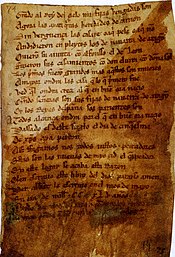
Back Idioma español en Colombia Spanish Kolonbiako gaztelania Basque Espagnol colombien French Castelán colombiano Galician Kolumbiai spanyol nyelvjárás Hungarian Испанский язык в Колумбии Russian Kolombiya İspanyolcası Turkish Tiếng Tây Ban Nha Colombia Vietnamese
This article possibly contains original research. (September 2019) |
| Colombian Spanish | |
|---|---|
| Español colombiano | |
| Pronunciation | [espaˌɲol kolomˈbjano] |
| Native to | Colombia |
Native speakers | 46,393,500 in Colombia, all users (2014)[1] L1 users: 46,300,000 (2015) L2 users: 93,500 (2015) |
Early forms | |
| Dialects | Bogotan (Rolo) Paisa Costeño Cundiboyacense Valluno Santanderean Pastuso Opita dialect Llanero Chocoano Isleño |
| Latin (Spanish alphabet) | |
| Official status | |
Official language in | |
| Regulated by | Academia Colombiana de la Lengua |
| Language codes | |
| ISO 639-1 | es |
| ISO 639-2 | spa[2] |
| ISO 639-3 | – |
| Glottolog | None |
| IETF | es-CO |
 Spanish Dialects in Colombia. | |
Colombian Spanish (Spanish: español colombiano) is a grouping of the varieties of Spanish spoken in Colombia. The term is of more geographical than linguistic relevance, since the dialects spoken in the various regions of Colombia are quite diverse. The speech of the northern coastal area tends to exhibit phonological innovations typical of Caribbean Spanish, while highland varieties have been historically more conservative. The Caro and Cuervo Institute in Bogotá is the main institution in Colombia to promote the scholarly study of the language and literature of both Colombia and the rest of Spanish America. The educated speech of Bogotá, a generally conservative variety of Spanish, has high popular prestige among Spanish-speakers throughout the Americas.[3]
The Colombian Academy of Language (Academia Colombiana de la Lengua) is the oldest Spanish language academy after Spain's Royal Spanish Academy; it was founded in 1871.[4]
Although it is subject to debate by academics, some critics argue that El desierto prodigioso y prodigio del desierto, written in the New Kingdom of Granada during the 1600s by Pedro de Solís y Valenzuela, is the first modern novel of the Spanish America.[5]
- ^ Spanish → Colombia at Ethnologue (21st ed., 2018)

- ^ "ISO 639-2 Language Code search". Library of Congress. Retrieved 21 September 2017.
- ^ Lipski (1994:205–207)
- ^ "La Academia Colombiana de la Lengua celebra el 150.º aniversario de su fundación".
- ^ "La Novela en la Colonia" (PDF). The Savrvs. 38 (2). May–August 1993.
© MMXXIII Rich X Search. We shall prevail. All rights reserved. Rich X Search
